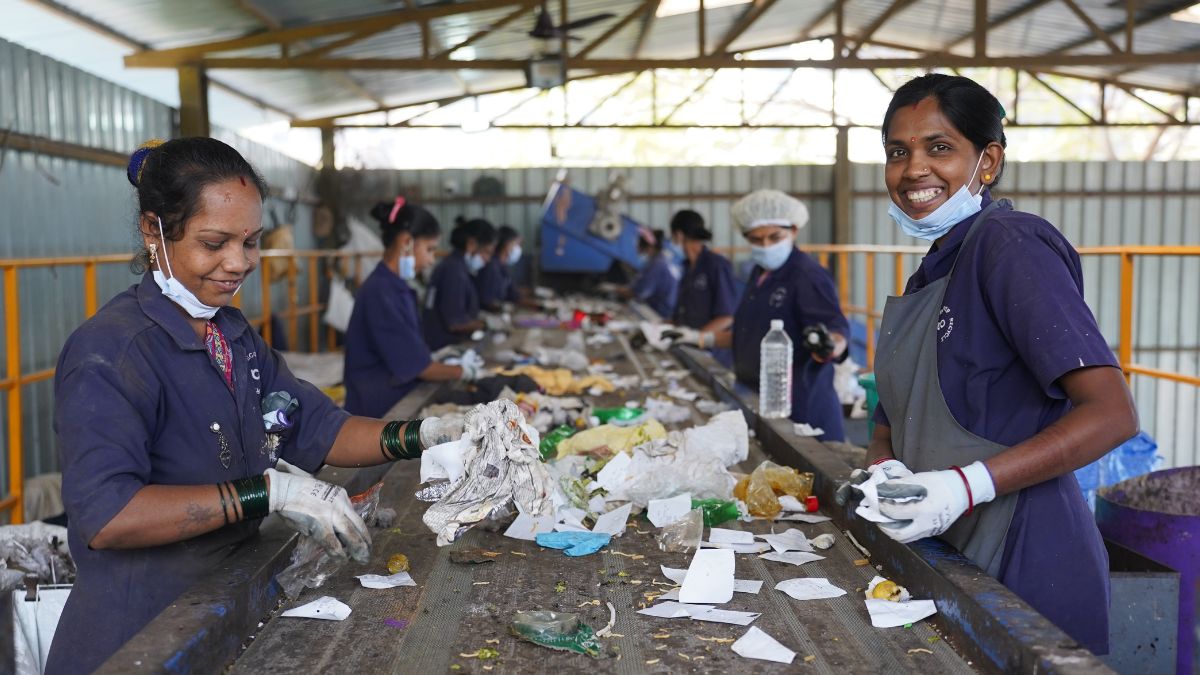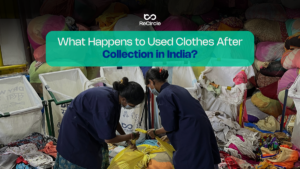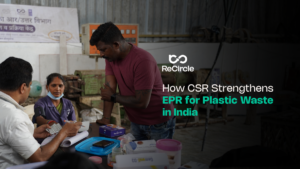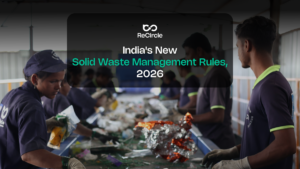India has been steadily tightening its environmental regulations around plastic usage and waste management, aligning with global sustainability goals . One of the most significant developments is the April 2025 mandate requiring the use of recycled plastic in packaging and products. This policy is directly tied to Extended Producer Responsibility (EPR) obligations, and it marks a turning point in how businesses must rethink their supply chains, material sourcing, and compliance strategies.
This article explores the implications of the mandate, the challenges and opportunities for industries, and how businesses can position themselves to not only comply but also build long-term value.
Understanding the April 2025 Mandate
The April 2025 mandate enforces the use of a defined percentage of recycled plastic content in packaging materials across multiple sectors such as FMCG, retail, pharmaceuticals, and e‑commerce. The specific targets vary by product category, but the overarching objective is to reduce virgin plastic dependency and accelerate India’s transition to a circular economy.
This requirement is nested within the Plastic Waste Management (PWM) Rules, which have evolved since their 2016 notification, with amendments adding stronger EPR targets and recycling benchmarks. By 2025, companies will no longer be able to rely solely on collecting and sending plastic waste for disposal; they must integrate recycled content directly into their packaging streams.
Extended Producer Responsibility (EPR) and Its Evolving Scope
Extended Producer Responsibility plastic compliance places the accountability for post-consumer waste management squarely on the producers, importers, and brand owners (PIBOs). Traditionally, EPR has meant financing and ensuring collection, segregation, and processing of plastic waste. The 2025 mandate adds a new dimension: evidence of recycled content usage.
In effect, compliance will now require:
- Recovery & Recycling Proof – PIBOs must demonstrate that their plastic waste has been processed through authorized recyclers.
- Recycled Content Integration – Proof that recycled material has been incorporated back into packaging.
- Transparent Reporting – Documentation via government portals ensuring traceability and accountability.
This evolution reflects India’s ambition to not just manage waste, but to embed circularity into its production cycles.
Business Implications of the 2025 Mandate
1. Supply Chain Re‑Engineering
Companies must revisit procurement strategies to source recycled resins that meet quality and safety standards. This will involve new partnerships with certified recyclers and technology platforms offering verifiable recycled material.
2. Increased Compliance Costs
While integrating recycled plastic is an environmentally progressive step, it does come with cost implications. Recycled polymers often have price premiums due to supply shortages, traceability requirements, and processing complexities.
3. Pressure on Informal Supply Chains
India’s recycling ecosystem is heavily reliant on informal waste workers. Formalization and traceability requirements may strain this system, but with the right interventions, it can become an opportunity for inclusive growth.
4. Brand Differentiation
Forward-looking companies that embrace recycled content can position themselves as sustainability leaders. The reputational benefits, coupled with consumer preference for eco‑friendly brands, may offset short‑term costs.
5. Risk of Non‑Compliance
Non‑compliance with EPR plastic obligations post‑2025 can invite financial penalties, reputational damage, and loss of operational licenses. Companies must treat compliance as a strategic priority, not just a regulatory checkbox.
Opportunities for Innovation
The mandate also creates significant opportunities:
- Material Innovation: Companies investing in R&D for high‑grade recycled polymers will gain a competitive edge.
- Technology for Traceability: Platforms offering end‑to‑end transparency, like blockchain‑enabled tracking, will become critical.
- Circular Partnerships: Collaborations with waste management organizations, recyclers, and startups will drive scalable impact.
- Consumer Engagement: Brands can leverage recycled packaging as a narrative for sustainability, engaging eco‑conscious consumers.
Strategic Pathway for Businesses
To adapt effectively to the April 2025 mandate, businesses should adopt a multi‑pronged strategy:
- Audit Current EPR Obligations – Assess current plastic usage, recovery efforts, and gaps in recycled content integration.
- Partner with Certified Waste Management Companies – Collaborate with organizations offering traceable recycling and compliance solutions.
- Integrate Circular Procurement Policies – Prioritize recycled materials in sourcing strategies.
- Invest in Consumer Communication – Highlight recycled packaging initiatives to build brand equity.
- Leverage Technology Platforms – Use data‑driven solutions for traceability, compliance reporting, and credit management.
Why Partnering with Us Matters
In today’s evolving regulatory landscape, businesses like yours need more than just recycling services; you need traceability, transparency, and scalability. That’s where we come in. At ReCircle, we are building a future where waste is not wasted, but reimagined as a resource.
Through our ClimaOne platform, we empower our partners to:
- Track and verify plastic recovery across the informal supply chain.
- Purchase plastic credits to meet EPR compliance and move toward true neutrality.
- Ensure ethical practices that protect and uplift waste workers who are at the heart of the recovery system.
- Explore textile waste recovery through initiatives like Project Extra Life.
When you partner with us, you don’t just meet extended producer responsibility (EPR) plastic mandates—you embed sustainability into your long-term business model. Together, we create measurable impact for your business, the environment, and the communities that sustain it.
Looking Ahead
India’s April 2025 recycled plastic mandate is more than just a regulation—it’s a turning point. It pushes all of us to embrace circularity, redesign packaging strategies, and adopt transparent systems that ensure accountability.
We know the journey comes with challenges, but we also see it as a catalyst for innovation, efficiency, and long-term brand value. Organizations that take decisive steps now won’t just stay compliant—they’ll be leaders in India’s shift toward sustainable business practices.
Our Commitment to You
At ReCircle, we’re not here to provide a one-time service. We’re here to walk with you on the path to circularity. By partnering with us, you’re choosing to:
- Future-proof your business against evolving plastic regulations.
- Unlock new opportunities in sustainability and compliance.
- Build a truly circular value chain that creates lasting impact.
This is more than compliance—it’s transformation. And we’re ready to make it happen with you.
Together, let’s turn responsibility into opportunity and build the future of circular business.
FAQs
1. How does the April 2025 mandate affect existing EPR plastic compliance?
It extends EPR obligations beyond collection and recycling proof, requiring businesses to integrate recycled plastic content directly into packaging.
2. Will recycled plastic be available in sufficient quantities for all industries?
Supply challenges are expected, but partnerships with certified recyclers and platforms like ReCircle can help businesses secure reliable recycled material.
3. Are plastic credits still relevant under the new rules?
Yes, but credits should complement not replace actual recycled content integration. They remain important for categories with technical or safety barriers.
4. What are the risks of non‑compliance?
Non‑compliance may lead to heavy penalties, reputational damage, and potential loss of licenses, making strict adherence crucial.
5. How can companies ensure traceability in their recycling efforts?
By working with certified waste management companies and leveraging technology platforms like ReCircle’s ClimaOne, businesses can ensure full transparency and compliance.




